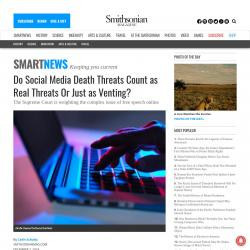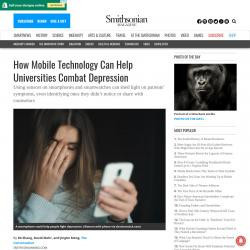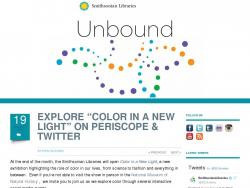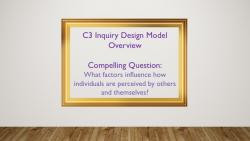Rosemith Metayer's collections
Software makes cyberbullies think twice
<p>Social media is a place where people can express their opinions. The internet is an unregulated world that has no forms of morals and it is also a frontier for cyber bullying. Young people are exposed to violence, verbal outbursts, nudism and explicit sexual content. When consumed for a long time, all these contents can lead to some serious issues. For instance, they may start having anxiety attacks and start to register them in their minds which can lead to mental issues. The following statement is from a then 13 year old from Chicago named Trisha Prabhu. She had came home from school and read a news story about an 11-year-old girl who had committed suicide by jumping off her town’s water tower. In the months before her death, the girl had been repeatedly cyberbullied.</p>
<p>“I was shocked, heart-broken and angry,” says Prabhu, now 15. “I knew I had to do something to stop this from ever happening again.”
</p>
<p>So Prabhu came up with a cyber-solution for cyberbullying. She invented a software called <a href="http://www.rethinkwords.org/" target="_blank">ReThink</a>, which scans social media messages for offensive content, and gives the writer a chance to reconsider whether he or she really wants to post. The program, which can be installed by parents on home computers or by teachers on school computers, uses context-sensitive word screening to flag messages for content.
</p>
<p>For Prabhu, ReThink is personal. She too had been cyberbullied in her younger years, receiving nasty messages about her clothes.</p>
<p>“I’m what you’d call thick-skinned, so I just brushed it off and moved on,” Prabhu says. “But after reading about this story, I realized that many adolescents were really affected by these offensive messages, especially if the cyberbullying was repeated and targeted.” </p>
<p>Cyberbullying is indeed a serious and growing problem. <a href="https://www.dosomething.org/facts/11-facts-about-cyber-bullying" target="_blank">Research</a> shows 43 percent of kids have experienced cyberbullying. Some 70 percent of students report seeing “frequent” online bullying. Bullying victims are up to nine times more likely to consider suicide.</p>
<p>ReThink works on the principle that the adolescent brain is like a “car with no brakes,” Prabhu says. “It’s all too well-known that adolescents make impulsive, rash decisions.”</p>
<p>It has indeed been well-established that the prefrontal cortex—a region of the brain important for self-control and decision-making—<a href="http://hrweb.mit.edu/worklife/youngadult/brain.html" target="_blank">doesn’t fully develop until a person is about 25</a> years old. This is likely a major factor behind teenagers’ sometimes <a href="http://www.scientificamerican.com/article/risky-teen-behavior-is-driven-by-an-imbalance-in-brain-development/" target="_blank">irresponsible and risky decisions</a>—texting and driving, fighting, even simply neglecting homework in favor of hanging out with friends.</p>
<p>Prabhu has received numerous accolades for her work. She was a <a href="http://www.smithsonianmag.com/science-nature/google-thinks-these-18-teenagers-will-change-the-world-180952293/" target="_blank">global finalist in the Google Science Fair</a>, selected to exhibit at the <a href="https://www.whitehouse.gov/blog/2015/03/20/meet-exhibitors-2015-white-house-science-fair-1" target="_blank">White House Science Fair</a> and received a <a href="https://www.auburn.edu/outreach/opce/antibullying/documents/2015-HeroAwardRecipients.pdf" target="_blank">Global Anti-Bullying Hero</a> award from Auburn University, among other honors.</p>
<p>Prabhu has long been fascinated by computer science; she first began learning to code at age 11 through a local technology education program for kids. Since developing ReThink, she has created a free ReThink <a href="https://itunes.apple.com/us/app/rethink-stop-cyberbullying/id1035161775?mt=8" target="_blank">app</a> for smartphones. She’s also rolled out a ReThink “ambassador” program for schools, where student representatives spread anti-cyberbullying messages to their classmates and students are invited to take an anti-cyberbullying pledge.</p>
<p>Prabhu has received multiple messages from people who know firsthand the trauma cyberbullying can cause—parents whose children have committed suicide after repeated cyberbullying, police officers who deal with cyberbullying on a criminal level, school counselors and administrators who struggle to help cyberbullied students. And then there are the victims themselves. One particularly memorable note Prabhu received was not from a teenager, but from an adult, a retired teacher who had been bullied for years by an adult adopted daughter. “Trisha,” the woman wrote, “ReThink would not only help adolescents, it would help adults too.”</p>
<p>To test how it works, I downloaded ReThink to my iPhone. I started to post "I hate you" to a Facebook wall (with no intentions, of course, of actually posting it), and a ReThink bubble popped up. “Let’s change these words to make it positive,” it suggested. “You’re a fat,” I began, and I was interrupted by “Don’t say things that you may regret later!” ReThink has a high sensitivity for obscenities. When I started the missive with a four-letter word, the ReThink bubble showed up to ask “Are these words really you?”</p>
<p>That said, the program did not catch everything. I was able to type "You're ugly and stupid" without getting a ReThink message, and somehow "nobody likes you, you idiot" also snuck through. </p>
<p>Though ReThink is clearly not yet a perfect tool for capturing all cyber cruelty, when it does offer teens a second chance they tend to take it. According to research conducted with ReThink, teens change their mind about posting the hurtful messages 93 percent of the time.</p>
<p>Prabhu ultimately hopes to have ReThink installed for free on school computers and libraries across the country, and even the world—she has plans to develop the program in multiple languages.</p>
<p>“I look forward to a day when we have conquered cyberbullying,” she says. </p>
<p><a href="http://www.smithsonianmag.com/innovation/new-software-makes-cyberbullies-think-twice-180956948/" target="_blank">http://www.smithsonianmag.com/innovation/new-software-makes-cyberbullies-think-twice-180956948/</a><br /></p>
<p> <a href="http://www.smithsonianmag.com/smart-news/do-social-media-death-threats-count-real-threats-or-just-digital-venting-180953506/" target="_blank">http://www.smithsonianmag.com/smart-news/do-social-media-death-threats-count-real-threats-or-just-digital-venting-180953506/</a><br /></p>
<p></p>
<p><br /></p>
<p></p>
<p><br /></p>
<p><br /></p>
 Rosemith Metayer
Rosemith Metayer
1
The positive and negative impacts of social media on our youths today
<p>The use of social media has both negative and positive impacts on youths. Some of the positive impacts include making them up to date on events that are happening around the world and also enables them to network and stay connected with their fellow youths and friends without physical meetings. Additionally, youths can create pages and groups in the social media platforms where they can built friendship with other youths who may share the same values with them and this can lead to long time friendship. </p>
<p>Even though social media seem to connect youths and make them stay up to date, but it can also leads to isolation, depression, anxiety and many other problems. Social media reduces the number of face-to face interactions, it can also decreases their productivity in school because of the amount of long hours they spend on these sites. Social media is also a platform where bullying can take place. Peer pressure is another concern for youths who are on these social sites. For example, they may look at pictures or videos of their peers doing illegal things such as drugs, drinking etc and they may have the urge to try these drugs because they may feel pressured by their friends, they don't want to be left out and not being a part of the crowd. </p>
<p> In conclusion, social networks has been proved to have both positive and negative effects on our youths. As parents we should guide and advise our children about the dangers of being in these sites when they are misused and overused. </p>
<p><br /></p>
 Rosemith Metayer
Rosemith Metayer
22
Software makes cyberbullies think twice
<p>Over the past two decades, social media have gained so much growth and fame to an extent that many researchers are now interested in learning more about these social platforms and their effects on our youths. The internet is an unregulated world that has no forms of morals and it is also a frontier for cyber bullying. Young people are exposed to violence, verbal outbursts, nudism and explicit sexual content. When consumed for a long time, all these contents can lead to some serious issues. For instance, they may start having anxiety attacks and start to register them in their minds which can lead to mental issues. Researchers have found that these social sites impact the lives of our youth a great deal in terms of morals, behavior and even education wise. </p><p> The following statement is from a then 13 year old from Chicago named Trisha Prabhu. She had came home from school and read a news story about an 11-year-old girl who had committed suicide by jumping off her town’s water tower. In the months before her death, the girl had been repeatedly cyberbullied.</p>
<p>“I was shocked, heart-broken and angry,” says Prabhu, now 15. “I knew I had to do something to stop this from ever happening again.”
</p>
<p>So Prabhu came up with a cyber-solution for cyberbullying. She invented a software called <a href="http://www.rethinkwords.org/" target="_blank">ReThink</a>, which scans social media messages for offensive content, and gives the writer a chance to reconsider whether he or she really wants to post. The program, which can be installed by parents on home computers or by teachers on school computers, uses context-sensitive word screening to flag messages for content.
</p>
<p>For Prabhu, ReThink is personal. She too had been cyberbullied in her younger years, receiving nasty messages about her clothes.</p>
<p>“I’m what you’d call thick-skinned, so I just brushed it off and moved on,” Prabhu says. “But after reading about this story, I realized that many adolescents were really affected by these offensive messages, especially if the cyberbullying was repeated and targeted.” </p>
<p>Cyberbullying is indeed a serious and growing problem. <a href="https://www.dosomething.org/facts/11-facts-about-cyber-bullying" target="_blank">Research</a> shows 43 percent of kids have experienced cyberbullying. Some 70 percent of students report seeing “frequent” online bullying. Bullying victims are up to nine times more likely to consider suicide.</p>
<p>ReThink works on the principle that the adolescent brain is like a “car with no brakes,” Prabhu says. “It’s all too well-known that adolescents make impulsive, rash decisions.”</p>
<p>It has indeed been well-established that the prefrontal cortex—a region of the brain important for self-control and decision-making—<a href="http://hrweb.mit.edu/worklife/youngadult/brain.html" target="_blank">doesn’t fully develop until a person is about 25</a> years old. This is likely a major factor behind teenagers’ sometimes <a href="http://www.scientificamerican.com/article/risky-teen-behavior-is-driven-by-an-imbalance-in-brain-development/" target="_blank">irresponsible and risky decisions</a>—texting and driving, fighting, even simply neglecting homework in favor of hanging out with friends.</p>
<p>Prabhu has received numerous accolades for her work. She was a <a href="http://www.smithsonianmag.com/science-nature/google-thinks-these-18-teenagers-will-change-the-world-180952293/" target="_blank">global finalist in the Google Science Fair</a>, selected to exhibit at the <a href="https://www.whitehouse.gov/blog/2015/03/20/meet-exhibitors-2015-white-house-science-fair-1" target="_blank">White House Science Fair</a> and received a <a href="https://www.auburn.edu/outreach/opce/antibullying/documents/2015-HeroAwardRecipients.pdf" target="_blank">Global Anti-Bullying Hero</a> award from Auburn University, among other honors.</p>
<p>Prabhu has long been fascinated by computer science; she first began learning to code at age 11 through a local technology education program for kids. Since developing ReThink, she has created a free ReThink <a href="https://itunes.apple.com/us/app/rethink-stop-cyberbullying/id1035161775?mt=8" target="_blank">app</a> for smartphones. She’s also rolled out a ReThink “ambassador” program for schools, where student representatives spread anti-cyberbullying messages to their classmates and students are invited to take an anti-cyberbullying pledge.</p>
<p>Prabhu has received multiple messages from people who know firsthand the trauma cyberbullying can cause—parents whose children have committed suicide after repeated cyberbullying, police officers who deal with cyberbullying on a criminal level, school counselors and administrators who struggle to help cyberbullied students. And then there are the victims themselves. One particularly memorable note Prabhu received was not from a teenager, but from an adult, a retired teacher who had been bullied for years by an adult adopted daughter. “Trisha,” the woman wrote, “ReThink would not only help adolescents, it would help adults too.”</p>
<p>To test how it works, I downloaded ReThink to my iPhone. I started to post "I hate you" to a Facebook wall (with no intentions, of course, of actually posting it), and a ReThink bubble popped up. “Let’s change these words to make it positive,” it suggested. “You’re a fat,” I began, and I was interrupted by “Don’t say things that you may regret later!” ReThink has a high sensitivity for obscenities. When I started the missive with a four-letter word, the ReThink bubble showed up to ask “Are these words really you?”</p>
<p>That said, the program did not catch everything. I was able to type "You're ugly and stupid" without getting a ReThink message, and somehow "nobody likes you, you idiot" also snuck through. </p>
<p>Though ReThink is clearly not yet a perfect tool for capturing all cyber cruelty, when it does offer teens a second chance they tend to take it. According to research conducted with ReThink, teens change their mind about posting the hurtful messages 93 percent of the time.</p>
<p>Prabhu ultimately hopes to have ReThink installed for free on school computers and libraries across the country, and even the world—she has plans to develop the program in multiple languages.</p>
<p>“I look forward to a day when we have conquered cyberbullying,” she says. </p>
<p><a href="http://www.smithsonianmag.com/innovation/new-software-makes-cyberbullies-think-twice-180956948/" target="_blank">http://www.smithsonianmag.com/innovation/new-software-makes-cyberbullies-think-twice-180956948/</a><br /></p>
<p> <a href="http://www.smithsonianmag.com/smart-news/do-social-media-death-threats-count-real-threats-or-just-digital-venting-180953506/" target="_blank">http://www.smithsonianmag.com/smart-news/do-social-media-death-threats-count-real-threats-or-just-digital-venting-180953506/</a><br /></p>
<p></p>
<p><br /></p>
<p></p>
<p><br /></p>
<p><br /></p>
 Rosemith Metayer
Rosemith Metayer
1















